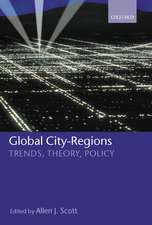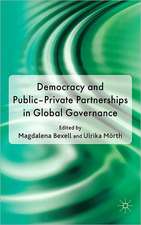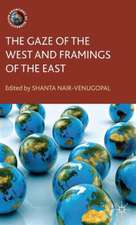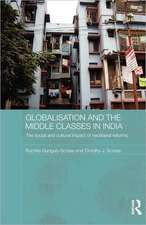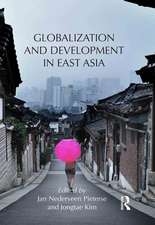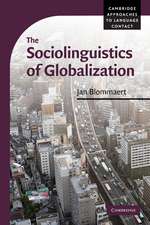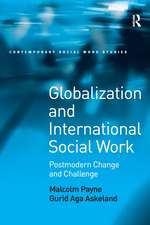Towards a Global Polity: Future Trends and Prospects: Routledge Studies in Globalisation
Editat de Richard Higgott, Morten Ougaarden Limba Engleză Paperback – 20 iun 2002
The contributors examine central aspects of this emerging global polity such as the role of law, of networks and of civil society. They discuss key theoretical and meta-theoretical questions on how to analyze and theorize the global polity, what drives it forward, and whether it can be democratized.
Contributed to, and edited by renowned names in the field, the outstanding scholarship presented in this topical book provides an original contribution to the literature on globalization and global governance.
| Toate formatele și edițiile | Preț | Express |
|---|---|---|
| Paperback (1) | 454.82 lei 43-57 zile | |
| Taylor & Francis – 20 iun 2002 | 454.82 lei 43-57 zile | |
| Hardback (1) | 1117.43 lei 43-57 zile | |
| Taylor & Francis – 27 iun 2002 | 1117.43 lei 43-57 zile |
Din seria Routledge Studies in Globalisation
- 17%
 Preț: 247.40 lei
Preț: 247.40 lei - 17%
 Preț: 246.93 lei
Preț: 246.93 lei - 15%
 Preț: 707.79 lei
Preț: 707.79 lei -
 Preț: 325.08 lei
Preț: 325.08 lei - 18%
 Preț: 701.01 lei
Preț: 701.01 lei - 18%
 Preț: 1055.51 lei
Preț: 1055.51 lei -
 Preț: 407.57 lei
Preț: 407.57 lei - 30%
 Preț: 334.87 lei
Preț: 334.87 lei - 21%
 Preț: 303.64 lei
Preț: 303.64 lei - 18%
 Preț: 1054.71 lei
Preț: 1054.71 lei - 15%
 Preț: 436.43 lei
Preț: 436.43 lei - 15%
 Preț: 531.26 lei
Preț: 531.26 lei - 25%
 Preț: 823.99 lei
Preț: 823.99 lei -
 Preț: 429.32 lei
Preț: 429.32 lei - 18%
 Preț: 1058.79 lei
Preț: 1058.79 lei - 18%
 Preț: 1059.80 lei
Preț: 1059.80 lei - 26%
 Preț: 818.67 lei
Preț: 818.67 lei - 18%
 Preț: 1004.34 lei
Preț: 1004.34 lei - 25%
 Preț: 766.85 lei
Preț: 766.85 lei - 18%
 Preț: 704.83 lei
Preț: 704.83 lei - 25%
 Preț: 766.98 lei
Preț: 766.98 lei - 15%
 Preț: 704.55 lei
Preț: 704.55 lei - 18%
 Preț: 1062.98 lei
Preț: 1062.98 lei - 18%
 Preț: 1062.62 lei
Preț: 1062.62 lei - 22%
 Preț: 299.67 lei
Preț: 299.67 lei -
 Preț: 415.24 lei
Preț: 415.24 lei - 18%
 Preț: 1068.88 lei
Preț: 1068.88 lei - 18%
 Preț: 1061.06 lei
Preț: 1061.06 lei -
 Preț: 494.07 lei
Preț: 494.07 lei -
 Preț: 416.26 lei
Preț: 416.26 lei -
 Preț: 319.81 lei
Preț: 319.81 lei -
 Preț: 429.82 lei
Preț: 429.82 lei -
 Preț: 437.13 lei
Preț: 437.13 lei -
 Preț: 471.33 lei
Preț: 471.33 lei - 18%
 Preț: 1002.63 lei
Preț: 1002.63 lei - 18%
 Preț: 1010.26 lei
Preț: 1010.26 lei
Preț: 454.82 lei
Nou
Puncte Express: 682
Preț estimativ în valută:
87.03€ • 91.10$ • 72.44£
87.03€ • 91.10$ • 72.44£
Carte tipărită la comandă
Livrare economică 31 martie-14 aprilie
Preluare comenzi: 021 569.72.76
Specificații
ISBN-13: 9780415277716
ISBN-10: 041527771X
Pagini: 286
Dimensiuni: 156 x 234 x 16 mm
Greutate: 0.43 kg
Ediția:1
Editura: Taylor & Francis
Colecția Routledge
Seria Routledge Studies in Globalisation
Locul publicării:Oxford, United Kingdom
ISBN-10: 041527771X
Pagini: 286
Dimensiuni: 156 x 234 x 16 mm
Greutate: 0.43 kg
Ediția:1
Editura: Taylor & Francis
Colecția Routledge
Seria Routledge Studies in Globalisation
Locul publicării:Oxford, United Kingdom
Public țintă
UndergraduateCuprins
Introduction: beyond system and society – towards a global polity? PART I Theorising the global polity 1 Global polity research: characteristics and challenges 2 The global polity and changes in statehood 3 Law in the global polity 4 Societal denationalization and positive governance PART II Non-state actors in the global polity 5 Discursive globalization: transnational discourse communities and New Public Management 6 Knowledge networks and policy expertise in the global polity 7 Civil society and governance in the global polity PART III Prospects and agendas for the global polity in the twenty-first century 8 The historical processes of establishing institutions of global governance and the nature of global polity 9 Europe: regional laboratory for a global polity? 10 From global governance to good governance: theories and prospects of democratizing the global polity
Notă biografică
Morten Ougaard is a Reader in International Political Economy at Copenhagen Business School. His research interests include international political economy, global governance, the international regulation of business and US foreign policy. Richard Higgott is Director of the Centre for the Study of Globalisation and Regionalisation and Professor of International Political Economy at the University of Warwick. His recent publications include two edited volumes, Non State Actors and Authority in the International System and The Political Economy of Globalisation.
Descriere
The role of law, networks and civil society are examined and key theoretical and meta-theoretical questions on how to analyse and theorise the global polity, what drives it forward, and whether it can be democratised are discussed.





